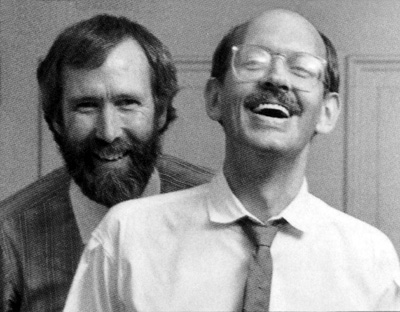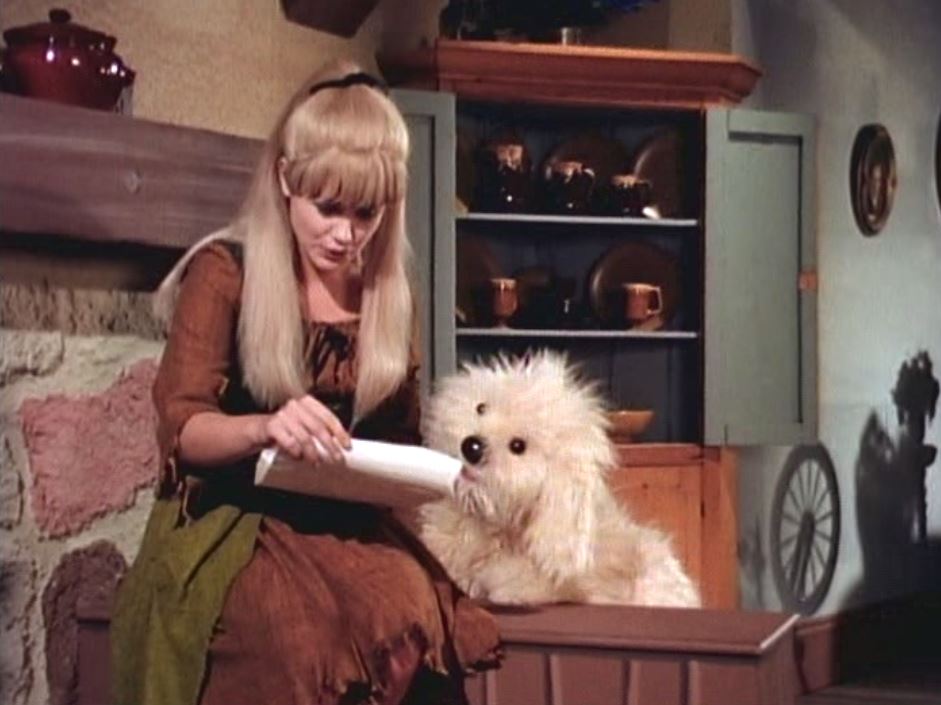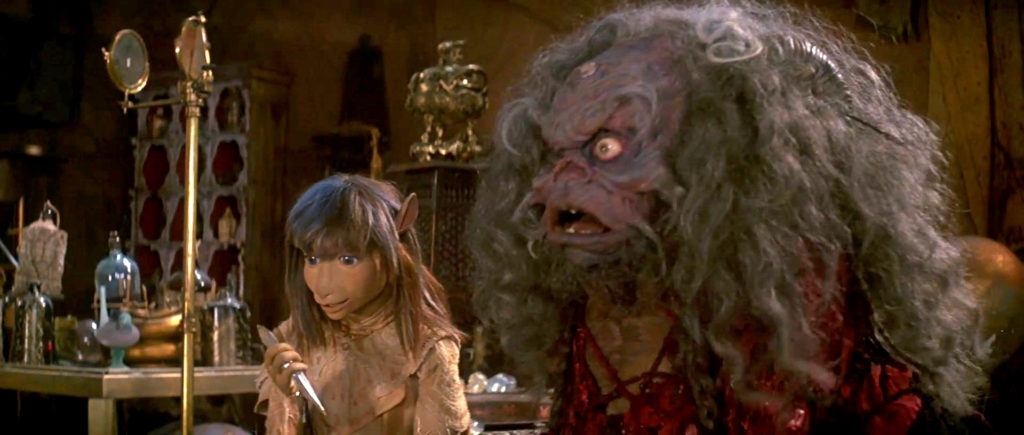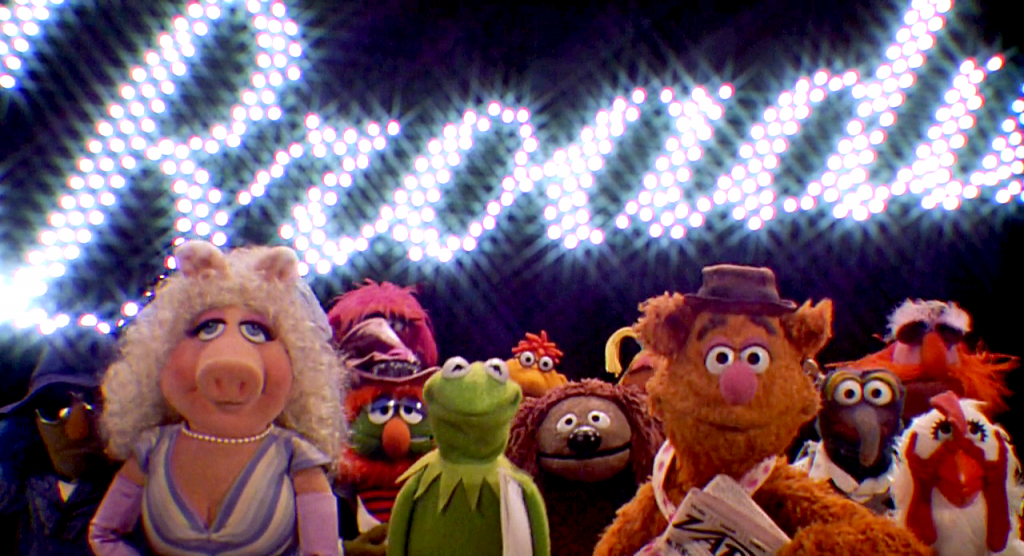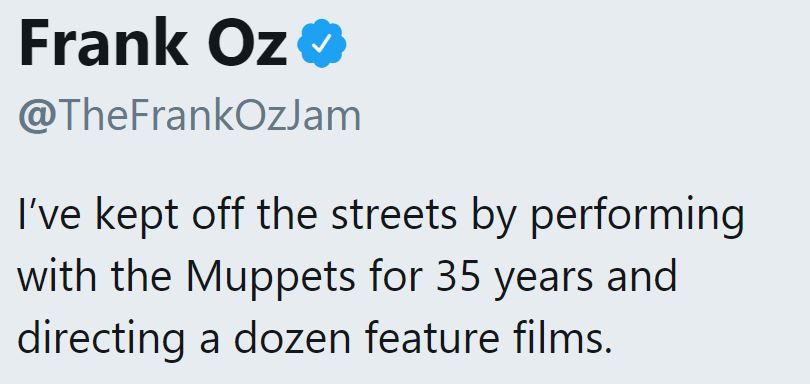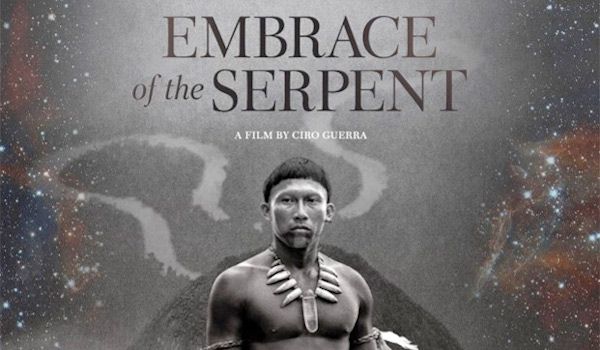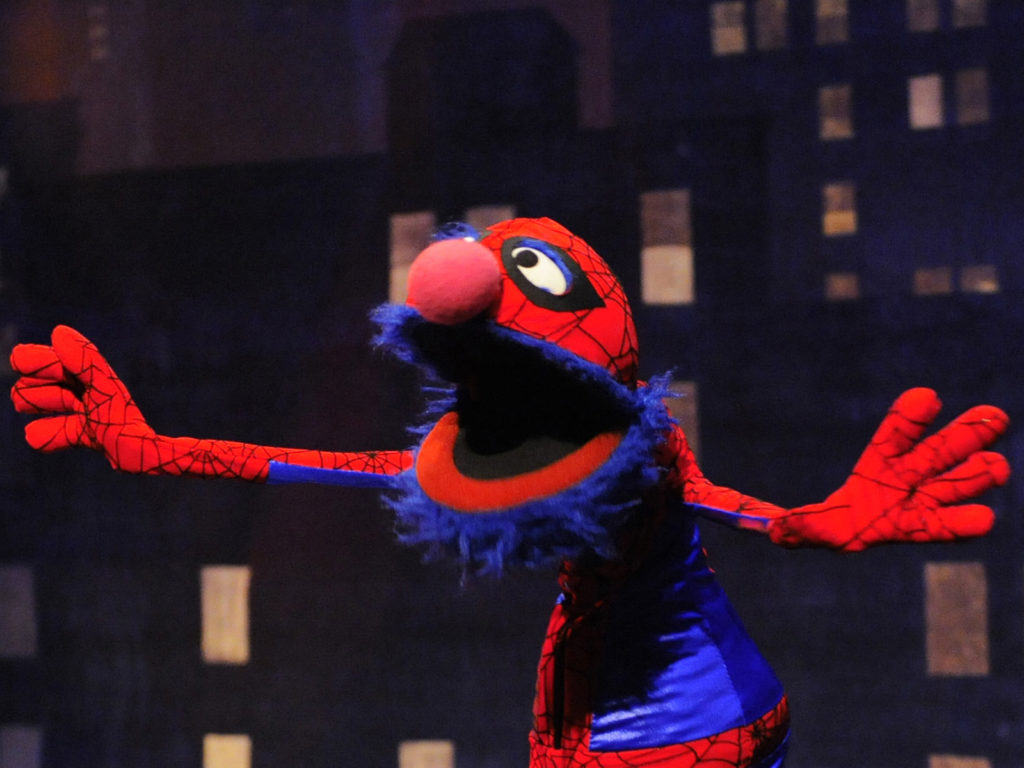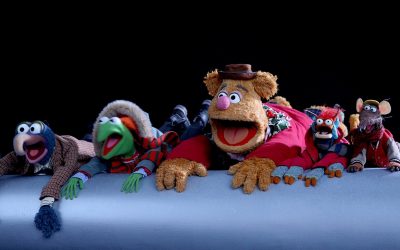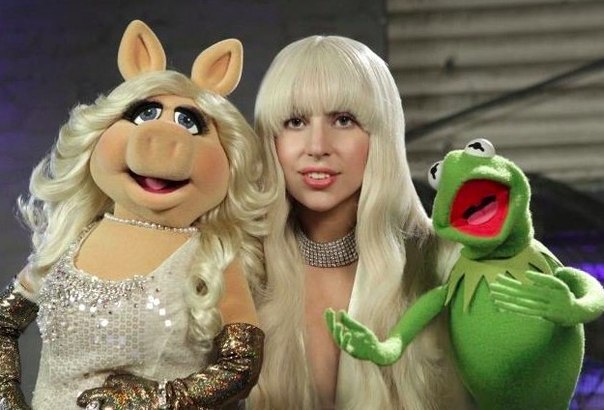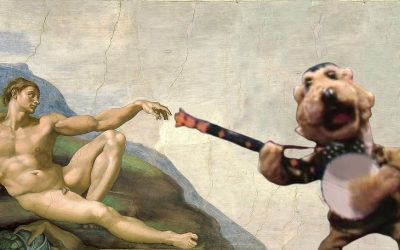Click here for Part 1 of our interview with Frank Oz, legendary Muppet performer, writer, filmmaker, and director of Muppet Guys Talking, the new documentary available March 16 only at MuppetGuysTalking.com! And now, Part 2!
TP: Among your characters’ funniest moments are some of the talk show appearances that you’ve done over the years. Do you essentially go in with the goal of causing as much chaos as possible, and have you ever noticed that the hosts of some of those shows might seem a little bit annoyed?
FO: I don’t think they’re annoyed. The answer is yes, I try to go in there and break things up, but I ad-lib. I don’t anymore, but all the dozens and dozens of talk shows I used to do, I always had an idea in mind, an attitude, and that’s all. Nothing written down, ever. I do like breaking things up, absolutely.
I remember one I enjoyed very much was Matt Lauer at The Today Show, and he introduced Piggy and she was extremely mad at him and wouldn’t talk to him. And that really was kind of a nice beginning, because you expect people to say, “Oh, hi, Matt! How are you?” And she was pissed. And then you start getting funny from there.
TP: The other ones that we love are on Martha Stewart. I think you did a few of those as Miss Piggy and Cookie Monster. That’s where you can tell that she just doesn’t know what to make of these characters.
FO: Well, she’s very smart. She’s a businesswoman. She doesn’t have a sense of humor, but she had smarts enough to know that her job is to just keep going forward, and then I get to jump in and have little darts, being sarcastic. But she’s very smart that way. She knows her job, and she knows that the worst thing to do is to try to be funny with a character. Or try to be funny at all. So she just kept on going forward like a train, and then I would be changing cars all the time.
TP: Some of your older characters, even predating your Muppet Show characters, I found interesting. Like Rufus the dog.
FO: Oh my gosh.
TP: Who seemed like he was maybe even going to be your signature character for a while there, before other characters started popping up. Do you have any memories of playing him?
FO: Oh, I sure do. And part of the reason I did Rufus was because I was scared to do voices, because I didn’t think I was very good at voices. So to me that dog was a way to express myself without having to face the fear of doing voices. But yeah, I enjoyed Rufus. He was fun to do, it was great. I remember doing him for the Valentine’s show, I remember doing him on a special in New York. I had a good time with him, he was fun.
TP: Is there any particular reason he didn’t carry over to later productions like The Muppet Show, or was there just some character turnover?
FO: I think the lack of the ability to talk. He’d have to connect with other characters, and it’s not as easy if someone doesn’t connect verbally with you.
TP: You also did the costume character the La Choy Dragon in the old commercials, is that right?
FO: Yeah, that is right.
TP: I’ve read that you refused to do another full-bodied Muppet after that, is that also correct?
FO: No, I actually did do a full-bodied Muppet with Jerry Nelson in the Christmas special [The Great Santa Claus Switch] with Art Carney, and I think it’s then that I refused. I hate doing those costume things.
TP: So even during The Muppet Show when they would have a whole bunch of Muppet monsters around, you would say, “Nope, I’m going to be on the ground, forget that?”
FO: No, it wasn’t necessary. Jim knew I wouldn’t do it. [laughs] Jim knew ahead of time I hated it, and it was just useless asking.
TP: We’ve noticed a few more characters in addition to the La Choy Dragon that you performed, but you didn’t perform the voice… like Ma Otter in Emmet Otter or Aughra in The Dark Crystal. Was that a bigger challenge for you?
FO: Those two were different reasons. Ma Otter, Marilyn Sokol did the singing voice, because I certainly can’t sing. So in order for Ma Otter’s voice to match the singing voice, it had to be Marilyn Sokol doing the rest of it. That was a necessity. It couldn’t be Marilyn’s voice singing and then I’d be doing the voice. That wouldn’t make any sense.
With Aughra, I was [also] doing the Chamberlain, and by that time I was involved in so many characters, Jim and I both felt that somebody else should do the voice because the voice I would have for Aughra would be too close to some of the other characters I did. That’s when we had the great Billie Whitelaw – she just passed, but she was a great actress and she was Aughra.
TP: Speaking of Dark Crystal, Jim obviously asked you to co-direct the movie with him. Until that time, although you had been equals in many ways, he was still always your boss. What was it like collaborating with him on an equal level on that project?
FO: I was never equal with Jim. I always knew that Jim was the boss. He was the one that made the final decisions. But he never treated me like an employee, he treated me like a friend and a partner. Working with Jim, he didn’t care about credit, he cared about the quality of the project. That’s why he asked me to work with him, because he knew that I had a bit more ability in certain areas that he didn’t. For instance, blocking and sometimes working with the actors and such, like that. He certainly was able to do it, but also by the fact of having me there, he could be involved in the much larger tasks of the story, and everything else.
It was great, but I think he fired me a couple times. At that time, I was still young enough to want to have a bit more attention, and the fact that Jim was really the main director and I was really helping him sometimes chaffed at me, but Jim in his patience and his care for me never let it affect him. It wasn’t always [difficult], it was a few times within those three years. But he was so patient with me and so supportive that that kind of went away too.
TP: Obviously it went well enough that he recommended you to direct Muppets Take Manhattan.
FO: Yeah, we just had a really special relationship, and he couldn’t do it, so I guess he felt it was time I could do it.
TP: Was it weird directing the rest of the Muppet cast that you had been working side by side with all this time, and now suddenly you had to be the boss and direct them?
FO: Yeah, it was not weird, it was bad. [laughs] Talk to Dave Goelz. What happened was, when I was up there on the first movie I ever directed by myself, I felt I had to know everything. And of course, that’s stupid. But when you’re a director and you’re in charge of all these millions of dollars, you feel you’ve got to do everything yourself and make sure everything’s right. That is ridiculously 180 degrees away from the truth, but nevertheless, I felt that.
I also knew the performers, what they could do and what they couldn’t do, and I was harder on them than I should have been, because I had all that pressure on me. I was a first-time director and part-writer on that, and also I performed about four or five of my characters, so I think unfortunately I was harder on those guys. You should talk to Dave Goelz about it. We laugh about it now, how much he hated me. [laughs]
TP: That movie kind of has a different tone than the two that came before it. It’s a little bit more down to earth, maybe grittier than the first two. Was that your approach? What was your philosophy on that?
FO: I think that’s very perceptive, because nobody’s ever seen that, but I feel I might have been too down to earth. What Jim did was extraordinary, and he was down to earth in his characters, but he was never really down to earth in the humor. The humor was a bit wilder. Mine was more grounded, you’re absolutely right. Muppets Take Manhattan was more grounded than the other stuff you’ve seen. Some people love that – I felt it was a failure on my part because it didn’t have that kind of Muppet wildness to it. Nevertheless, it seems like it did okay.
TP: Oh yeah, it’s a great movie. It holds up as one of my favorite movies of all time, I think partially because it’s so different from the other Muppet movies. I don’t think I would want that as the new direction for the Muppets, but to kind of take a break from the chaos and show, “Oh, they’re like real people!”
FO: Yeah, I think that was again the human being I was – and to a degree, still am, but as much as I can get lunatic, I also feel a story needs to be more grounded. Where Jim felt it wasn’t necessarily the ground that was important, it was the entertainment and the Muppets’ wildness. Again, that was a lesson I learned, and fortunately it turned out okay. And again, Jim gave me all his support.
TP: You’re also credited as having rewritten the script. Do you remember what the script was like before you added your own touches to it?
FO: The way it was written was more jokey and less grounded, and I felt it was too jokey and it wasn’t about their relationships. There’s now a situation where I told Jim in my opinion I thought it was too jokey, too much just for the laughs, and not enough about the relationships and the characters themselves. What I did in the rewrite is, I made it more grounded – for good or bad – and I had more focus on the relationships of the characters than just the jokes.
TP: Speaking of Muppet movies, we understand you wrote a script for The Cheapest Muppet Movie Ever Made. Can you tell us anything about that?
FO: Right. Yeah, after Muppets Take Manhattan we realized it was too expensive to make a Mupept movie the way we’ve been doing it. It was just too expensive. So I said to Jim and Jerry [Juhl], well, let’s just tell the truth. Let’s just say, “It’s too expensive,” let’s just make the cheapest Muppet movie we can, and just admit it.
Jerry Juhl wrote The Cheapest Muppet Movie and I kind of worked with him as an editor, but he’s the writer. And Jim. That never came about, and then years later with Disney, I still loved the idea, and I wrote it with Jim Lewis helping me, but it turned out Disney just wanted the Jason Segel movie, and just forgot about and dumped mine. That’s what happened.
TP: That’s a shame. We’d still love to see it in some form.
FO: Yeah, it would have been funny. It would have been really nice.
TP: Were there other projects you worked on that didn’t come to fruition?
FO: With the Muppets? Not really. The only thing I can remember is not really the Muppets, but in the 1960s before Sesame Street, Jim wanted to create a nightclub called Cyclia, which was not unlike, in those times, Electric Circus and things like that. Those are kind of psychedelic nightclubs. He wanted to do that with about sixteen projectors against the wall and against dancers and such, and projecting things. I shot reams and reams of 16mm film for that, but then it just never got going. That’s the only one I can remember.
TP: People can go see the video – I’m assuming some of the video that you shot – [in the Jim Henson Exhibition] at the Museum of the Moving Image right now, which is pretty exciting for us to see.
FO: Yeah, that was my first venture into moviemaking, so that was a huge lesson for me.
TP: The only other project I have written down that you were involved in that didn’t end up happening was “Pig of the Nineties,” which was going to be the Miss Piggy campaign right before Jim had passed.
FO: Yeah, but that wasn’t my project, that was a marketing project. That wasn’t realty a creative performance project, that was pure marketing. I had nothing to do with that.
TP: We have a few questions for you that are really more about you than the Muppets. You just joined Twitter. How are you liking it so far?
FO: I’m having a great time. I joined Twitter to let people know about Muppet Guys Talking. I never liked social media at all, so I joined Twitter, and it turns out I’m enjoying talking to the fans so much I’m not even talking about Muppet Guys Talking.
TP: We really appreciate it, because just to have this quasi-personal connection to you has been really exciting and important to the fans.
FO: That’s nice. People mention all the time about me writing a book, and I’m just too damn lazy. To actually work, it’s like doing a book report in high school. Twitter, I can just say little things here and there that I believe, and remembrances, and that’s not like writing a book, that’s throwing stuff out, so I’m enjoying that.
TP: What kind of music do you listen to these days?
FO: You know, these days I don’t listen to music. I used to listen to a tremendous amount of jazz. When I was younger, I would actually listen to Broadway showtunes. And I’d listen to folk, in the folk era of the 60s and such. Now it’s very eclectic when I do listen. I like world music, because there’s much more vitality, I think, in world music than in the United States’ music. But I don’t really listen to music that much – somehow I took a hiatus and I’m not sure why.
TP: Do you have any favorite movies, or favorite movies from recent years?
FO: Oh my God. Favorite movies in general, that list is ever-elastic, because I’ll say, “Oh yeah, these are my ten favorite movies,” and all of a sudden somebody will say, “What about this movie?” I’ll say, “Oh yeah, of course that movie!” And then somebody will say “What about this movie?” “Of course, I forgot that movie!” And on and on like that.
I’m not original. My favorite movie still is Citizen Kane, and Orson Welles is my favorite director, so I’m not original at all in my choices.
TP: What was the last movie you saw that really moved you or made you think?
FO: There was a black-and-white movie, it was up for an Academy Award about three years ago. Embrace of the Serpent. That blew me away. And some movies – Phantom Thread, I thought that was stunning this year. Of course I loved Birdman tremendously. I could do this for the next three hours – “I remember this!”
TP: We’ll do another interview – “Frank Oz on Movies.”
TP: Are you working on another project right now after Muppet Guys Talking?
FO: Well, there’s some stuff around. It’s not the same as it used to be out in Hollywood, but there’s some stuff around. I don’t like to talk about it, because then I sound like every silly director talking about all his projects, and all of a sudden they go away and then you’re embarrassed. [laughs] So I don’t like to talk about it much, because they’re not real. It’s just talk right now.
TP: We did want to mention both of us saw [the Frank Oz-directed stage show] In & Of Itself and enjoyed it greatly. It was a great show.
FO: Oh, when did you see it? In LA or New York?
TP: In New York.
FO: How long ago did you see it?
TP: [Ryan] saw it several months ago, maybe late last year. And [Joe] probably saw it about a month later than that.
FO: Well, that’s great. I’m very proud of that and Derek [DelGaudio, the writer/star] is doing a stunning job, and it’ll be probably about a year and three months before he closes. It closes in August, so that’s a hell of a long run for an off-Broadway play.
TP: I [Joe] do want to ask, though: After I saw the show – I hope this doesn’t spoil anything, but I went looking for the brick, and it was not there.
FO: It was not there?
TP: It was not there. And I just want to let you know that I no longer believe in magic. Magic is not real.
FO: [laughs] Well, what happens is, people take the brick.
TP: Yeah, that’s what I figured.
FO: Actually, there’s an online – somewhere, there’s all the photos of the bricks, after the shows.
TP: I’ve seen that! It’s like a map. [Joe to Ryan:] You found the brick, right? [Ryan:] I did find the brick!
FO: Yeah, it depends on if people are going to share it with people or just take it home, I guess.
TP: I will say, the one nice thing was, just because other people were walking from the theater, there were a few of us that were kind of migrating together. We made some new friends, that were all searching for the non-existent brick together.
FO: That’s nice, yeah. That show about identity opens people up, to be a bit more open with other people.
TP: Yeah, it’s a really good experience. So just to start wrapping things up: Looking forward, you’ve talked a lot about how you feel about the Muppets and the Sesame Street characters, and the integrity of the characters and things like that. In your opinion, if the Muppets are coming back with new projects, what would you like to see those be? In an ideal world?
FO: In an ideal world, I guess I’d just like them to be truer. Whatever the projects are, as long as they’re pure in their characters and pure in their relationships. That’s all that matters to me.
TP: Sure. And I know people have probably asked you a million times if you’d ever come back, but if you did, and assuming you wouldn’t want to perform again, would you want to come back in a different aspect – maybe to write or direct?
FO: No, no, I’d be happy to perform, but nobody asks me. Sesame Street doesn’t ask me and Disney doesn’t ask me. I’d be happy to come back to perform. Not all the time, because I’m a director now, I’m busy. But I used to perform a few days a year on Sesame Street, but about five years ago they stopped asking me, so that’s why I don’t perform.
TP: Well, the 50th anniversary is coming up, so they should ask you back for something.
FO: Yeah. Well, it’s the way it is. They want me for other things, but the idea of performing with the guys, that’s not something they want. And I understand, because I’m more expensive than the people doing my characters, which I think is appropriate because I created them.
TP: Sure. Especially for something like the 50th anniversary, it seems like it’d be well worth the additional cost to get you in the door.
TP: Just to wrap things up, do you have a message that you’d like to give to our readers, to your fans out there before we say goodbye?
FO: Well, only that I’m absolutely amazed and thrilled that after all these years people still love the characters. That just makes me and all of us feel so good. So thank you for just nurturing this, because that’s what’s important to all of us, just characters and the relationships between the characters. I just basically say thank you.
TP: And thank you again for talking to us, for making this amazing movie, and just for all the great stuff over the years.
FO: Thank you so much, guys. Oh, can I do my sell piece here? Can I sell a used car?
TP: Yeah, go for it!
FO: Can I sell my Brooklyn Bridge? Because Muppet Guys Talking is not at Netflix, and not on HBO, and it is not on DVD, it is nowhere else, could you just mention that the only place you can get it is at MuppetGuysTalking.com? That’s our own site, MuppetGuysTalking.com. We wanted to have a more personal relationship with the fans as opposed to having a big company between us, so MuppetGuysTalking.com is the only place you can get it [on March 16].
TP: We have a lot of readers who are very excited about it! We’ll make sure everyone knows about the website, make sure everyone sees the movie… We can’t wait to hear what everyone thinks about it. We think everyone’s really going to love it.
FO: Thank you guys for hanging in there for so many years and supporting it. I think it’s a testament to the purity of the characters, myself, so thank you very much.
TP: Thank you, Frank.
Click here to hear the audio of this interview! Click here to look for the brick on the Tough Pigs forum!
by Ryan Roe (Ryan@ToughPigs.com) & Joe Hennes (Joe@ToughPigs.com)

